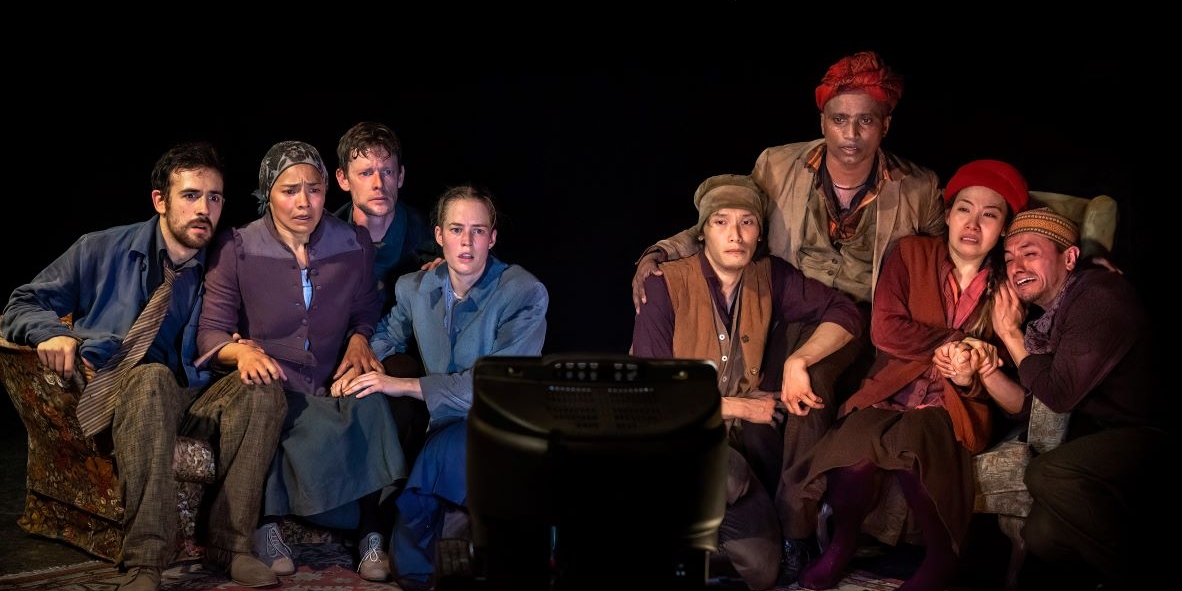When I came out of the theatre after an evening of watching the Gecko company’s KIN the other night at the Oxford Playhouse, the word that came into my mind immediately to describe what I had experienced was “mesmerising”.
It is very hard to write about this original, fascinating, and utterly compelling evening of storytelling, presented entirely through movement, dynamic music and striking visual effects, without spoiling the experience for you. In the case of this kind of physical theatre, the experience is all, and I don’t want to risk spoiling the immediacy and surprise of that experience.
Inspired, we are told in a programme note, by the voyage of Leah, who embarked on an epic journey from Yemen to Palestine in 1932, the performers dance, weave in and out around each other to a unique soundtrack of vocals and music, act out salient moments in the lives of their characters, inhabit a world that is all too topical today of people forced to flee their land, journey through dangers to save their lives, face hostility from strangers and even from their own people. We see the community of the fleeing, the rejection of some, the acceptance of others.
The music is based, I think, on a series of ethnic song and folk music from many cultures and the dancers are so visually compelling and at times stunning to look at in the shapes they make severally and together that the whole evening compels total concentration and engagement. The energy is electric. A lot of the language of the soundtrack of the evening seemed almost not to be language, seemed based simply on the articulation of human emotions behind the words we were hearing helping us in listening to an evocation of terror, anxiety fear and despair and eliciting our pity and our understanding. This makes for, in my opinion, Brechtian Theatre of Alienation of the most successful kind insofar as it is using the simplest, most obvious theatrical means to fire our imaginations and emotions and make us understand the world outside the stage.
The show KIN was commissioned by the National Theatre from Amit Lahav, Leah’s grandson, also one of the performers and the founder and Artistic Director of the brilliant ensemble called Gecko that is touring this production around the UK before bringing it to the Lyttleton Theatre in London. Lahav has collaborated with set and costume designer Rhys Jarman to create a visually lush and thematically enhancing environment for the performers. Dave Price’s pivotal musical contribution to the proceedings was given to us through the excellent sound design of Mark Melville. Inspired by Lindsay Kemp and David Glass, Lahav attracts for his work an international cast of performers. I believe this is his eighth theatre piece. Lahav concentrates on working with the emotion, physicality, metaphor, and music of the team developing the work through workshops communally for each show. Lahav’s shows, which have won multiple awards since 2001, tour nationally and internationally.
The intensity of KIN created a world of its own; but for me the climax, the moment that pulled together the entire evening, was when the cast, one by one, came forward and told us who they were and where they had come from and why they had come to the UK. Most were refugees or asylum seekers. One had been born here of foreign parents and saw himself as having two nations, two worlds, two homes. Was everyone in the audience inspired to think of their own identity, their own backgrounds? I would hope for Rishi Sunak, Suella Braverman and the entire Cabinet of the UK to experience this example of performance art, listen to the tone of all the music and singing and chanting, watch the display of acting and movement achieved by the cast, and wonder if they could still insist that multiculturalism does not work. To my mind, this show, like their own achievements, is an irrefutable argument that it does.
KIN explores the themes of racism, family and self-identity, migration and the creation of a place to call home. The show is a clear tribute to multiculturalism and its importance in our fractured world today. I highly recommend it for its theatricality, story, and sublime originality.

